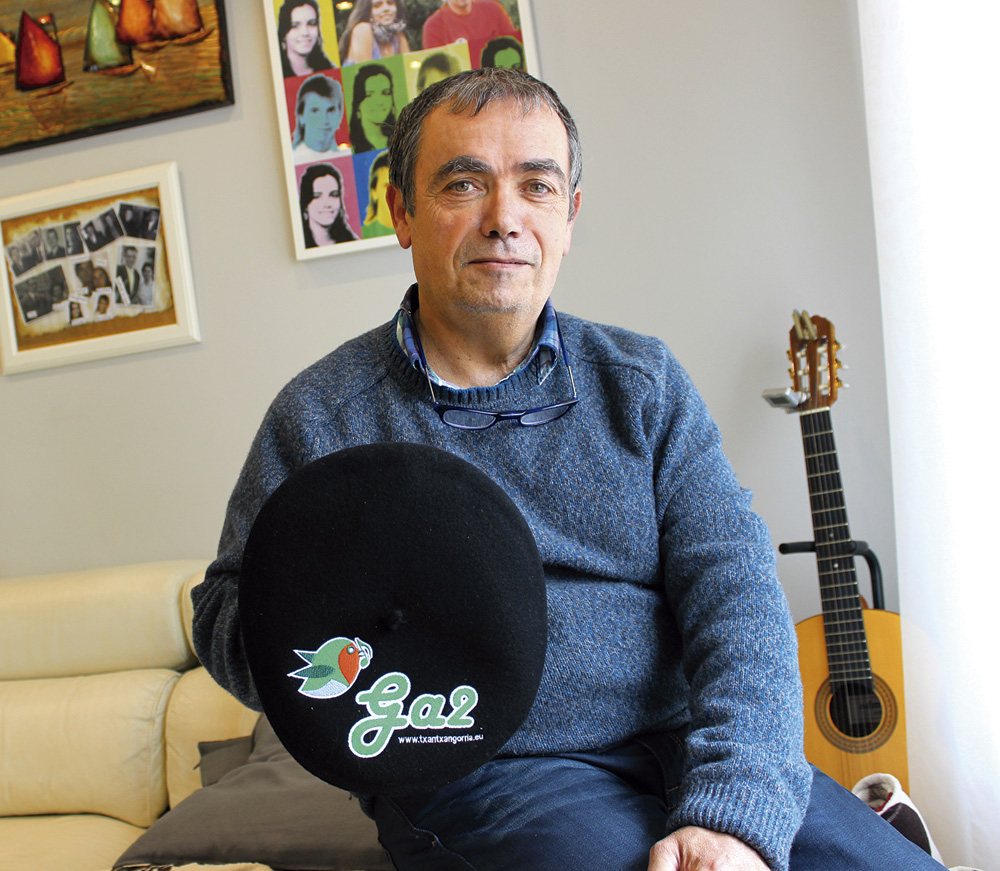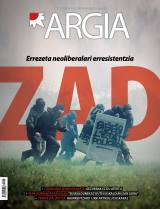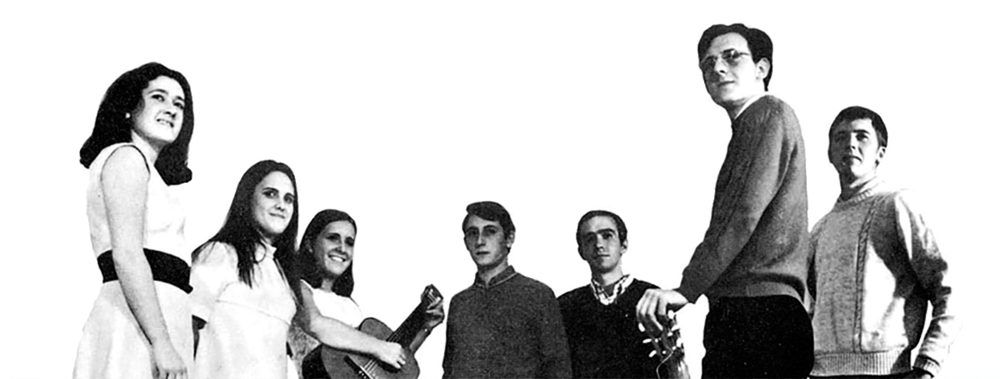"The archaeology of Basque music motivates me a lot"
- Gabi de la Maza’s portal txantxangorria.eus has been awarded this year with the 2010 ARGIA Internet Award. Today, 2,300 songs are in Basque in karaoke and in no way has an unbeatable welcome. On the other hand, the channel it has on Youtube was the most visited in Euskera last year.

Elektronika ikasketak egin zituen lehenik, irakasle-ikasketak gero, Plentziako Euskal Girotze Barnetegian egin ditu urterik gehienak. Ikasleak motibatu nahirik hasi zen kantua baliatzen, eta teknologia berrien bidean, euskarazko 2.300 kantu karaokean jartzera heldu da. “Jaso dezala eskua Youtuben Txantxangorriaren karaokerako euskal kantaren bat sekula erabili ez duenak”, Itsaso Zubiria Etxeberriaren galdera aurtengo ARGIA Sarien banaketaren kronikan.
You've been a professor for 37 years, we just retired.
I retired on October 3. I am one of the professors transferred by the Spanish State to the Basque Country, who took a teaching position before the Basque Government called the first opposition. I also welcome the pension, for example, from the Spanish State budgets, without the Spanish Social Security. I was a professor of Primary Education for eleven years, seven, at Gorliz School. When the eighth grade was about to start, the school clerk posted an announcement on the plank: A single plaza for the Centro de Afianzamiento Idiomatica de Plentzia. It was going to be solved by the internal competition procedure, and if it won, it lost the Primary until then.
You won the competition, you started working at the Idiomatic Hobby Center.
I've been working for 26 years at the barnetegi. In Plentzia, for eighteen years. The barnetegis program was implemented by the Department of Education of the Basque Government, after the implementation of the teaching models A, B and D, so that students can practice Euskera in their free time. At that time, Mikel Zalbide, Joxemari Berasategi, Ibon Olaziregi, Iñaki Artola… and Agustin Mujika Takolo presented the barnetegi project. It was approved by the Basque Government and the first barnetegi was held in Euba. At that time it was aimed at students of model B and the stay lasted twelve days. He was transferred to Plentzia in 1990 for five years in Euba. I started there the following year.
There were also other barnetegis.
Yes. Among them were Alkiza and Gazteluko. Then the ones from Aubixa, Elgoibar, and the ones from Segura and Barria were opened, each with its own characteristics in ages and models. Of course, there was a process in which the centers of model A were less and less, those of model B and D more and more. Today, barnetegis welcome all ages and models. We reflected and arrived at this conclusion with close coordination between the five centres.
The intention of barnetegis is to promote the use of Euskera. Is that where the karaoke of songs in Basque comes in?
At first, the aim was to use Euskera, but now it is more motivating than to increase the use of Euskera at the present time. We came to this working hypothesis, aware of the different problems presented by one model and another. As for the songs, in the barnetegis we used to fill the day of activities that the students did one after the other, they didn't even have time to breathe. We played a narrow press, and we got the students talking in Euskera when they were with us. As soon as we walked away, if the press relieved, the use of Euskera would decrease.

Among these activities was singing in Basque.
Yes. We were making a songwriter with 30 songs that the students would hear and sing every day. We also put them in a public address. Although intuitively, we thought that songs could be the reference of the Basque language for the students, in the environment in which they lived, and that they would relate it to some positive experience in the barnetegi. By pulling this thread we come to work the motivation, rather than pushing the use of the moment. Motivation leads to safe use. No motivation no use.
How did you work that motivation?
We had to identify the interests of the student and the group of students, bring the dynamics from within the group to the surface through the game: how the boys and girls, the leaders, the case of the isolated or marginalized students … We used group dynamics strategies and we played. Next, we took into account what happened in the game and analyzed the relationships within the group. They were moments of great intensity, in which the students spoke in Euskera, sometimes the groups were united… We worked positive experiences, in Euskera, so that the students also related Euskera with a positive experience. Of course, we were playing with emotion.
What does that have to do with your song and karaoke?
Songs excite us. They're full of feeling. The songs we used wisely, we knew that this student, once leaving the boarding school, would listen to the song in Basque and put it in relation to the positive experience. We used very well-known, very attractive songs that have lasted several years.
For example?
The Hertzainak Declaration, for example, was twenty years in our basket. Four Itoiz rooftops – but the students liked the version of EH Sukarra – the death of Xalbador… Since 1991, a lot. At first we used to go with vinyl records. In the morning, we looked at the time, we picked up the students, we told them the news and we sang with the students comfortably seated and with the basket in hand. We played music and we sang. Meanwhile, we also spent the microphone between the students to sing. In the end, we completed the list of 180 unspeakable songs.
180 incuntable?
Yes. At the same time as the Mp3 entered, ETB started making the Best Song program and there they went to the death of Xalbador, Lau teilatu, Aitormena… and at the end of the program they published a collection of versions of the songs most voted by the people. Some versions I didn't like anything. He preferred originals. “I myself will make the collection of originals in mp3 format.” And I jumped in the mp3 and picked up those who had chosen on the television show. But even though I had introduced them, I had a big space on the CD. “From the 91’s, I’ll add the songs we’ve been in the barnetegi.” And I also put them, and then, the ones I liked, until I filled the CD. At the end, 180 songs. The unspeakable, in my opinion, the best Basque songs. We would complete the album and give it to the teachers of the students who went to the barnetegi to continue singing at school.
So is your karaoke?
I started putting songs in karaoke around 2004, when I learned how to do it. It was the time of computer science and new technologies, the audio-visual were in fury. I learned and put 25 songs in karaoke to use in barnetegi. We also had resources and were trained in the world of video creation, since from the very beginning we prepared and gave the students the video of our stay in the barnetegi. We first used the analogue table and the monitors. Then we start with the computer.
People don't have the ability to take advantage of technology. Unlike you.
I also had to say that: in addition to high school, I also studied electronics. In our house you can see the TV screen, the computer, etc. everywhere. When the new technologies arrived, I felt very comfortable with that world. Also the Basque music, of taste…
Since when?
As a young boy, Beatles, Bob Dylan, Neil Young, Victor Jara, Joan Manuel Serrat… I heard them all. At the age of sixteen or seventeen, Benito Lertxundi, Xabier Lete, Imanol – above all – entered when he did not yet know Euskera.
Didn't you know Basque?
No, but by then I already sang in the Jatorki choir in Bilbao. When I was a young boy, when I was 11, I sang in the choir of high school. Timothy Urrengoetxea was the director. Agur jaunak, Boga-boga… then I studied. Then he came to learn Basque when he was doing Vocational Training. I started in Bilbao, at night, at the Karmelo de Santutxu. In the morning I was studying Electronics. In the afternoon, sixth high school at the Txurdinaga Institute. Leaving there at 10 p.m. and to Karmelo, to learn Basque with the crew. We were taught by the carmelita Bittor, from Mañaria.

Then you learned Basque.
I got the first classes there. Then came the need to go to military service, and there I also continued to learn Basque, with the Basque method of Xabier Gereño. I was a soldier in León (Spain), and in the company we were nineteen young people from Bilbao. One day, we were checked into the closets and seventeen people had the Gereño method. Seventeen! Ajajajajajajajajajajajajajajajajajajajajajajajajajajajajajajajchess… When I returned from military service, I began to work in a taxi in Bilbao, while studying magisterium.
Ah!
Yes, yes… At 22 years old I went to register and enrolled in the science branch. I left the secretariat and, as I went down the stairs, I met Juan Luis Goikoetxea. We had seen ourselves here and there in the patriotic movements. At that time I spoke Basque very awkwardly, but I understood everything or almost everything. And Juan Luis said: “What have you enrolled in?” “In science,” I say. That year the branch of Basque philology was going to spread at the School of Magisterium in Bilbao and was hunting students. “Kill in Basque philology, we need people. On Thursday they won’t open it.” And although I didn't have an Euskera level, I went with him to the secretary and changed the tuition. I was in Basque philology.
That, of course, would have led you to improve Euskera.
No doubt. I was working at night in the taxi. Many times, at the station, I waited and there I prepared the oral exams. Tell someone who knew Euskera well to record the lesson on the tape, and I would hear it in the taxi, to listen to me. And also music. When I got to the third level, when it came to doing the internships, some technicians came from the education delegation, looking for teachers who taught Basque in the schools. They wanted graduates, because in previous years there were people without a degree that taught them.
This is the moment of the beginning of the autonomy of the CAV.
1980 accounts. So I started teaching Basque at school, a specific teacher, in Plentzia. The next year, I finished my studies and I was sent to Arrieta-Libao's school on Sollube's skirts. I was the first Basque professor since the time of Franco. I was there three years, having disciples of all ages: Under 3 years old, over 14 years old. Twenty-one students The first month was hard, but since then it was wonderful. From Arrieta I went to Gorliz's school, and then to the barnetegi. That's been my trajectory.
We will have to say before the karaoke is fortified.
So far, I've assembled 2,300 songs. When I use the photos, it takes about three hours for me to compose a song. If it's a video clip, if you don't have more work to add the letter, I have an hour or more. If it's rap, three hours. The images are mine, or they're picked up on the internet. I also use photoshop to work on photos, change colors or assemble the assembly with two or three people. The last, that of the Kantuzaleak association, on the occasion of the Day of the Old Songs held in Navarra.
When is the Txantxangorri portal?
I opened the website in 2004. In 2008, a year-end group told me in the barnetegi: “Why don’t you upload your karaoke to Youtube?” I remembered the idea and I opened the Youtube channel. This afternoon I uploaded the first song. And then I started to upload songs from that year's collection to Youtube. Soon people began to ask for specific songs and, at the same time, I uploaded others that I had at my fingertips. In the end, I went into that dynamic, pulling out our list of “incunables.” In addition, novelties. But here's one thing: In 2005, I had a knee surgery and I had to stay still for a while. I took the vinyls from home, the ones from the barnetegi, the ones from Irale… I took them all and digitized them, at home, with all the gadgets: audio, dish, table of audio mixes connected to the computer… and digitized all the Basque music I had at hand.
Excellent work.
I had six months off, and that's what I did at the time. And I'm still in it. The archaeology of Basque music motivates me a lot. There's also the news. I'm in touch with many singers on Facebook, and that also helps me a lot.
“Koadrilarekin hasi nintzen euskaraz ikasten. Laster, batzuek ez zidaten euskaraz baino hitz egiten, Iñaki Aurrekoetxeak, adibidez. Baionan hil zen, errefuxiatuta zegoela, 1996an. Iñaki Sope. Lagun mina nuen. Maila ez-formalean asko erakutsi zidan berak”.
“Hainbat urtetan, amesgaizto bat izan dut: berriro soldadutzara itzuli beharra. Ametsik gaiztoena nuen hori: izerdi patsetan esnatzen nintzen. Amets gozoa ere banuen, ordea: Arrietako eskolara itzultzen nintzela. Oso giro euskalduna zen, eta neure burua euskaraz janzten asko lagundu zidan”.
“Behin, disko bilduma bidali zidaten Kanadatik. Euskaldun batek. Francoren garaian, diskoei azalak kendu eta katalogoan sartu zituen, kartulinazko azal berriak eginda eta diskoen edukia boligrafoz idatzita: Pantxoa eta Peio, Labegerie, Manex Pagola, Etxamendi eta Larralde, Maite Idirin… Aparatu berria erosi eta horiek digitalizatzen ari naiz orain”.
“TBX.eus atariak euskarazko kanalek jaso dituzten bisitak zenbatzen ditu, eta egunean, astean, hilean, urtean… gehien ikusi diren euskarazko bideoak zein izan diren adierazten du. Iaz, txantxangorria.eus izan zen bisitatuena!”.
Last year, I met a Braham in Delhi. I was surprised that I loved beer and knew it in Spanish. I would say it would be my oldest, but I was walking with the help of a stick, slowly. To see why he knew Spanish, I asked him and he told me that he learned as a child because he heard... [+]
You know how it goes, right? "Dream txuntxurrun green, dream bite...". It is undoubtedly the most famous crib song in Euskera, and also has Vitoria as its protagonist. After a brief study, I learned that Resurrection Mª de Azkue collected in 1922 three versions of the song in his... [+]
Abenduaren 6an agurtu du pilotaren munduak azaroaren 30ean zendutako azkaindarra. Profesional mailan ezker paretan txapela jantzi zuen Ipar Euskal Herriko lehen pilotaria da: bi txapel jantzi zituen binakako txapelketan, Joxan Tolosarekin.
Gasteizko Oihaneder Euskararen Etxearen Batera proiektuen emaitzetarik bat gauzatu du berrikitan Maider Lasak, Malen Iturrirekin elkarlanean. Ekainean aurkeztu zuten Loa, loa, laguna izeneko ikusgarri performatiboa, ahotsez, gorputzez eta irudiz. Tradiziozko lo-kantak oinarri,... [+]
Bost hamarkada baina gehiagoko ibilbidearekin, Oskarbi taldeak badaki zer den egoera zailetan musikaren eta kulturgintzaren haria elikatzea. Ez Dok Amairuren garaietatik gaurdaino, herri kantak eta sormen propioa izan ditu iturri. Hamabigarren diskoa grabatzen ari dira, dozena... [+]
Artzain izan nahi zuen txikitatik, eta artzantzaz bizi da duela hogei urtetik hona. Kantuan aritzea gustuko du eta kantuan ari da etxean bezala plazaz plaza. Ez omen da bizitza idilikoa berea, baina ez omen litzateke beste inon eta beste ezertan zoriontsuago izanen. Urepeleko... [+]
























